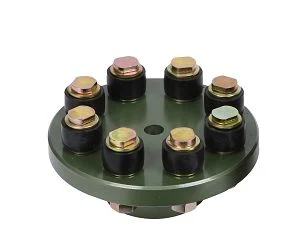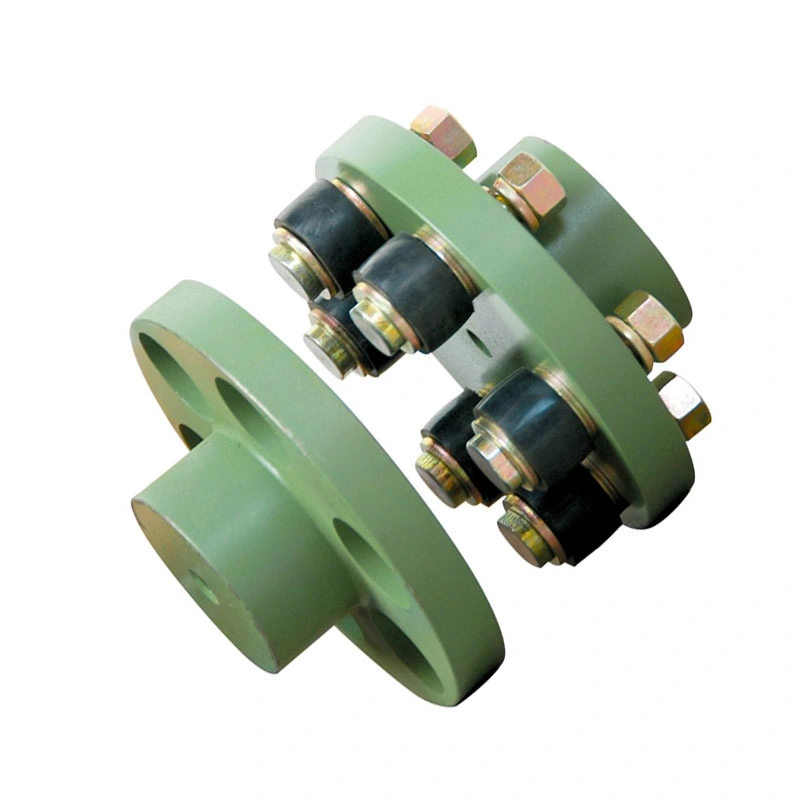Product Description
Detailed Photos
Product Description
1.Style 1N standard flexible coupling provides flexible connection by the gap between pipe groove and coupling key.
2.Unique design allows both axial and radial movement, suitable for pipeline with flexibility under intermediate pressure.
3.Enhanced body resists 4 times working pressure.
Product Parameters
1.Housing material:Ductile iron conforming to ASTM A-536, grade 65-45-12.
2.FM Approved & UL Listed:R.W.P. rated working pressure 300PSI(2.065MPa / 20.65bars)
3.Housing Finish:Fusion Bonded Epoxy Coated(Optional:Hot Deep Galvanized and Others)
4.Coupling gasket material:EPDM(Optional:Nitrile NBR,Silicone and Others)
5.Bolts and Nuts:Heat treated and electro galvanized bolts with oval neck, and heavy duty hexagon nuts. Track head meeting the physical and chemical requirements of ASTM A-449 and physical requirements of ASTM A-183.
6.Size Range:DN25 through DN300 (1″ through 12″)
Certifications
Company Profile
CONDOR brand Grooved products are developed and manufactured by ZheJiang Condor Machinery Imp.& Exp. Co., Ltd., which is established in 2009 and most professional manufacturing enterprise of piping products. CONDOR is the 1 of first grooved products manufacturer in China,equipped with most advanced casting, milling, painting and assembling facilities, including 3 DISA automatic molding line, semi-automatic casting machine, precision casting line, large size floor molding system and relevant comprehensive testing equipment.
CONDOR owns 2 casting factories, 1 rubber millingfacility and 2 assembling centers. Over 500 employees, annual casting productioncapacity 100,000tons. Our total floor space over 110,000m², annual turnover exceeds 120 million USDCompany services
CONODR Piping Systems Solutions span many markets. Our piping system are found CHINAMFG in multiple applications-from commercial comfort piping system; industrial process and utility piping; petrochemical and metallurgy industries; coal and mineral mining operations; water and wastewater plants and facilities. CONDOR Piping Systems Solution covers fire-hydrant and sprinkler system, water spray and water mist system, foam and gas system .For all systems CONDOR offers unique solution for each
individual practice and actual problem.
CONDOR brand Grooved products are designed, manufactured, managed strictly by UL listed and FM approved system under
ZheJiang Condor Machinery Imp.& Exp. Co., Ltd.
FAQ
1. Q: Are you a manufacturer or trading company?
A: We are valve manufacturer and factory, and not trading company.
2. Q: Do you have agent or representative abroad?
A: We do not have agent abroad, please contact us to purchase valves directly.
3. Q: What’s your product range?
A: We can produce Butterfly valve, Gate valve, Check valve, Control valve, Y strainer, By ISO/ANSI/DIN/JIS/ EN/GOST/AS standard.
4. Q: Is there any stock in your factory? And how about your lead time?
A: We stock valves with normal sizes. The lead time depends on your quantity, Generally about 30 days.
5. Q: Which countries do you export to?
A: We export directly to vast majority of countries in the world.
6. Q: What certificates will you provide?
A: We can provide UL FM.
7. Q: After-sales service
A: 18 months year warranty for all kinds of products.
As an experienced manufacturer, you can rest assured of the quality and sales service.
8. Q: Transportation
A: Transported by DHL, UPS, EMS, FedEx, SF, by Air, by Sea.
9. Q: Do you provide free sample?
A: Free sample is OK for us.
10. Q: Do you accept custom design on size?
A: Yes, if the size is reasonable.
/* January 22, 2571 19:08:37 */!function(){function s(e,r){var a,o={};try{e&&e.split(“,”).forEach(function(e,t){e&&(a=e.match(/(.*?):(.*)$/))&&1

What are the torque and speed ratings for different sizes of flexible couplings?
The torque and speed ratings of flexible couplings can vary depending on their size, design, and material. Manufacturers typically provide specifications for each specific coupling model to ensure it is suitable for the intended application. Below are some general considerations regarding torque and speed ratings for different sizes of flexible couplings:
Torque Ratings:
The torque rating of a flexible coupling is the maximum amount of torque it can reliably transmit without experiencing excessive deformation or failure. It is essential to choose a coupling with a torque rating that exceeds the torque requirements of the application to ensure proper operation and avoid premature wear. Torque ratings are typically specified in Nm (Newton-meters) or lb-ft (pound-feet).
The torque capacity of a flexible coupling can increase with its size and design. Larger couplings, which have more substantial components and a larger flexible element, often have higher torque ratings compared to smaller couplings. Additionally, couplings with a more robust design, such as metallic couplings, generally have higher torque capacities compared to elastomeric couplings.
Speed Ratings:
The speed rating of a flexible coupling is the maximum rotational speed it can withstand while maintaining its structural integrity and performance. It is critical to select a coupling with a speed rating suitable for the application’s operating speed to avoid excessive wear and potential coupling failure. Speed ratings are typically specified in revolutions per minute (RPM).
Like torque ratings, the speed rating of a flexible coupling can be influenced by its size, design, and material. Larger couplings with more robust construction can often handle higher rotational speeds compared to smaller couplings. Metallic couplings, with their stiffer and more precise design, can also have higher speed ratings compared to elastomeric couplings.
Consulting Manufacturer Specifications:
To determine the torque and speed ratings for specific sizes of flexible couplings, it is essential to consult the manufacturer’s product specifications or technical datasheets. These documents provide detailed information about the coupling’s capabilities, including torque and speed ratings for each available size and model.
Application Considerations:
When selecting a flexible coupling, it is crucial to consider the torque and speed requirements of the specific application. Factors such as the power transmitted, the rotational speed of the machinery, and any transient or shock loads should be taken into account to ensure the selected coupling can handle the demands of the system.
Summary:
The torque and speed ratings of flexible couplings can vary based on their size, design, and material. Manufacturers provide specific torque and speed ratings for each coupling model to ensure their suitability for different applications. Consulting manufacturer specifications and considering the application’s requirements are vital in selecting the right flexible coupling that can handle the torque and speed demands of the mechanical system.

Can flexible couplings be used in precision manufacturing equipment, such as CNC machines?
Yes, flexible couplings can be used in precision manufacturing equipment, including CNC (Computer Numerical Control) machines. CNC machines require high accuracy and precision during operation to produce complex and intricate parts. Flexible couplings play a vital role in such equipment by providing various benefits that enhance their performance and reliability.
- Compensation for Misalignment: CNC machines often have multiple moving parts and axes that need precise alignment. Flexible couplings can accommodate small misalignments between these components, ensuring smooth and reliable power transmission without inducing additional stress or strain on the system.
- Vibration Damping: Precision manufacturing requires minimizing vibrations that could affect the quality of the finished product. Flexible couplings with damping properties can absorb and dissipate vibrations, resulting in better surface finishes and accuracy of the machined parts.
- Torsional Flexibility: CNC machines may experience torque fluctuations during acceleration, deceleration, or tool changes. Flexible couplings with torsional flexibility can handle these variations and prevent torsional vibrations from affecting the machining process.
- Backlash Compensation: Some types of flexible couplings, such as beam couplings, offer minimal or near-zero backlash. This characteristic is essential in CNC machines, as it helps maintain positional accuracy during direction changes and reversals.
- High Torque Transmission: CNC machines may require high torque transmission capabilities, especially in heavy-duty cutting or milling operations. Flexible couplings can handle substantial torque loads while still providing flexibility to address misalignments.
- Reduced Maintenance: With the ability to absorb shocks and compensate for misalignment, flexible couplings can extend the life of other mechanical components in the CNC machine, reducing overall maintenance requirements and downtime.
It’s important to select the appropriate type and size of flexible coupling based on the specific requirements of the CNC machine, including torque, speed, misalignment, and environmental conditions. Regular maintenance and inspection of the flexible couplings will ensure optimal performance and contribute to the overall precision and efficiency of the CNC machine.

How does a flexible coupling affect the noise and vibration levels in a mechanical system?
A flexible coupling plays a crucial role in controlling noise and vibration levels in a mechanical system. It can significantly impact the overall smoothness and quietness of the system’s operation, contributing to enhanced performance and reduced wear on connected components.
Noise Reduction:
Flexible couplings help reduce noise in a mechanical system through their inherent ability to dampen vibrations. When the shafts of rotating machinery are not perfectly aligned, it can lead to vibrations that are transmitted throughout the system, resulting in noise generation. The elastomeric or flexible element of the coupling acts as a vibration dampener, absorbing and dissipating these vibrations. As a result, the noise levels in the system are reduced, creating a quieter operating environment.
Vibration Damping:
Vibrations in a mechanical system can lead to increased wear and tear on critical components, such as bearings, seals, and gears. Excessive vibrations can also cause resonance and damage to the system over time. Flexible couplings can effectively dampen vibrations by acting as a buffer between the driving and driven shafts. The flexible element absorbs the shock and vibrations, preventing them from propagating to other parts of the system. This vibration damping capability not only reduces noise but also protects the system from potential mechanical failures, extending the lifespan of the equipment.
Alignment Compensation:
Misalignment between shafts is a common cause of vibration and noise in rotating machinery. Flexible couplings excel at compensating for both angular and parallel misalignment. By accommodating misalignment, the coupling reduces the forces acting on the shafts and minimizes the generation of vibrations and noise. Proper alignment through the use of a flexible coupling ensures that the system operates smoothly and quietly.
Effect on Equipment Reliability:
Reducing noise and vibration levels has a positive impact on the reliability of connected equipment. Lower vibrations mean less stress on bearings and other rotating components, leading to extended component life and reduced maintenance requirements. A quieter operating environment can also be essential for certain applications, such as in laboratories or precision manufacturing processes, where excessive noise can interfere with delicate tasks or measurements.
Applications:
Flexible couplings find application in a wide range of industries, such as manufacturing, power generation, material handling, automotive, aerospace, and robotics. They are commonly used in pumps, compressors, fans, conveyors, and other rotating machinery where noise and vibration control are critical for smooth and reliable operation.
Summary:
A flexible coupling’s ability to reduce noise and dampen vibrations makes it an essential component in mechanical systems. By compensating for misalignment and providing vibration dampening properties, the flexible coupling enhances the overall system performance, reduces noise levels, and protects connected equipment from excessive wear and mechanical failures. Choosing the right type of flexible coupling based on the specific application requirements can have a significant impact on noise reduction and vibration control in the mechanical system.


editor by CX 2024-04-08